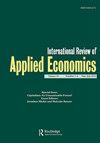Zombie firms, financial inclusion and women’s bargaining power, and other issues
IF 1.6
Q3 ECONOMICS
引用次数: 0
Abstract
When companies get into such financial difficulties that they cannot meet interest payments out of profits, they’re referred to as ‘zombie firms’. During recessions, many firms will find themselves in this predicament. Any subsequent recovery may be weakened if large numbers of such firms are still clinging on, possibly by meeting interest payments through further borrowing – perhaps combined with slashing their investments in training and R&D. In ‘Not all zombies are created equal. A Marxist-Minskyan taxonomy of firms: United States, 1950-2019’, Nicolás Águila & Juan M. Graña develop a taxonomy of firms that is more sophisticated than just ‘zombie’ or ‘non-zombie’ (according to the above description of being able to meet interest payments out of current profits). They look also at firms’ actual levels of profitability, and at leverage ratios. Their aim is to look beyond the financial characteristic – of being able to meet interest from profits – to consider productive characteristics as well. Their main finding is that the principal problem of U.S. firms is productive, not financial – as there is a high share of firms with increasingly negative profitability even before the payment of interest and despite having relatively low leverage. In other words, even taking the financial issue of needing to repay loans out of the equation, these firms aren’t productive enough to make any profit at all. Hence, they argue:僵尸公司,金融包容性和女性议价能力,以及其他问题
当公司陷入财务困境,无法用利润支付利息时,就被称为“僵尸公司”。在经济衰退期间,许多公司会发现自己处于这种困境。如果大量这样的公司仍在坚持下去,可能会通过进一步借款来支付利息——或许还会削减他们在培训和研发方面的投资,那么随后的复苏可能会受到削弱。并不是所有的僵尸都生而平等。马克思-明斯基企业分类法:美国,1950-2019”,Nicolás Águila和Juan M. Graña开发了一种比“僵尸”或“非僵尸”(根据上文对能够用当前利润支付利息的描述)更复杂的企业分类法。他们还关注公司的实际盈利水平和杠杆率。他们的目标是超越财务特征——能够从利润中获得利益——考虑生产特征。他们的主要发现是,美国公司的主要问题是生产问题,而不是财务问题——因为在支付利息之前,尽管杠杆率相对较低,但有很大一部分公司的盈利能力越来越负。换句话说,即使不考虑需要偿还贷款的财务问题,这些公司的生产力也不足以产生任何利润。因此,他们认为:
本文章由计算机程序翻译,如有差异,请以英文原文为准。
求助全文
约1分钟内获得全文
求助全文
来源期刊

International Review of Applied Economics
ECONOMICS-
CiteScore
4.30
自引率
4.50%
发文量
37
期刊介绍:
International Review of Applied Economics is devoted to the practical applications of economic ideas. Applied economics is widely interpreted to embrace empirical work and the application of economics to the evaluation and development of economic policies. The interaction between empirical work and economic policy is an important feature of the journal. The Journal is peer reviewed and international in scope. Articles that draw lessons from the experience of one country for the benefit of others, or that seek to make cross-country comparisons are particularly welcomed. Contributions which discuss policy issues from theoretical positions neglected in other journals are also encouraged.
 求助内容:
求助内容: 应助结果提醒方式:
应助结果提醒方式:


